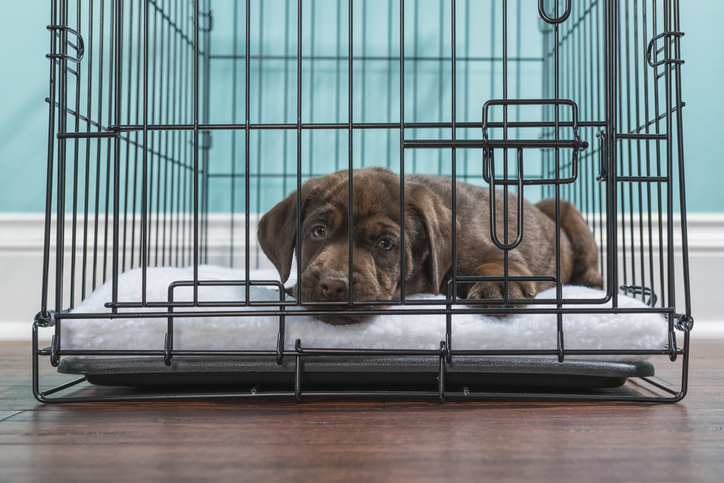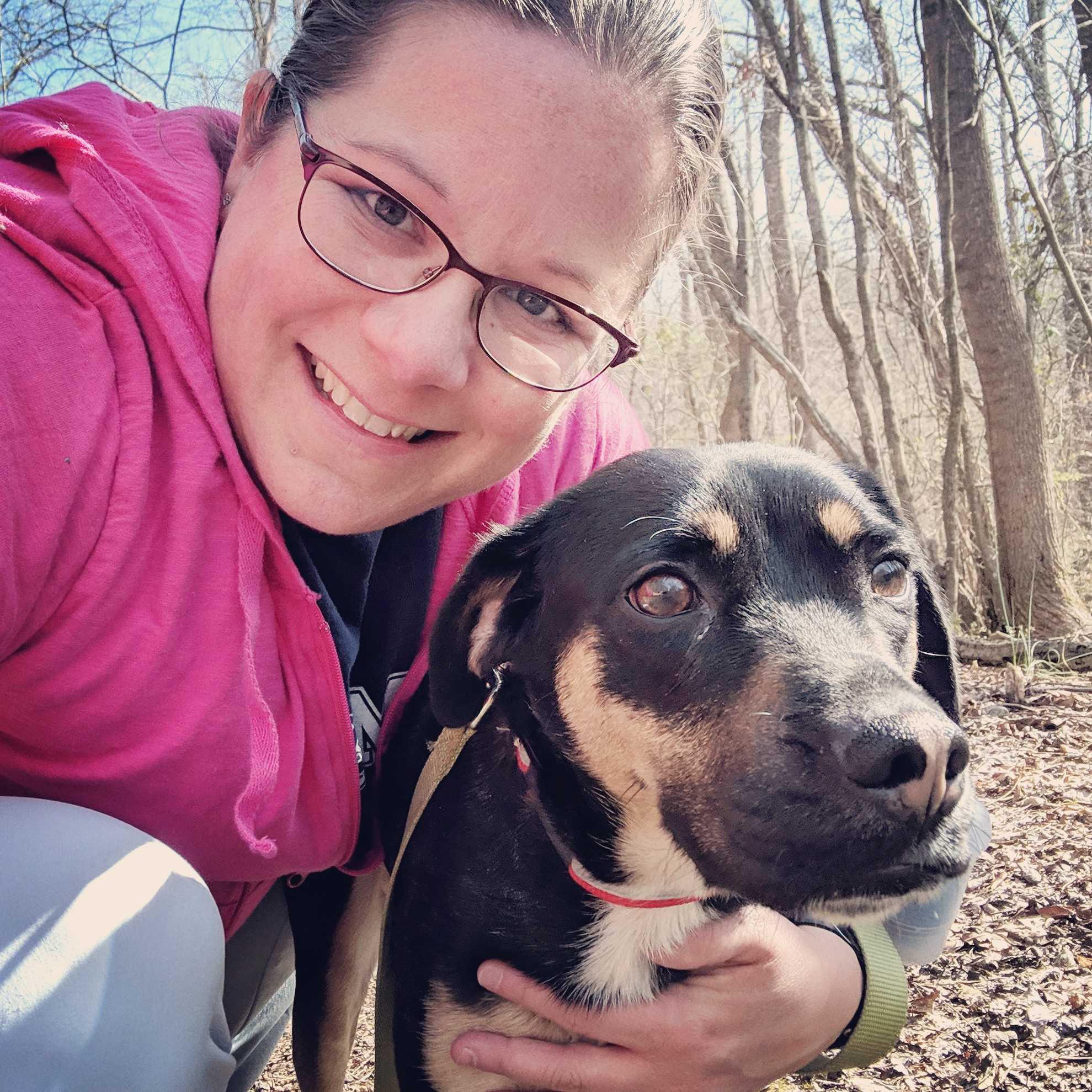How to Get a Puppy to Sleep Through the Night

Knowing how to get a puppy to sleep through the night will mean you and your new dog will both be better rested during those early few weeks. Believe it or not, sleepless nights aren't necessarily an inevitable part of being a puppy parent and young dogs are constantly learning from human cues, so it's up to you to ensure that your puppy learns to sleep through the night.
Success will require careful attention to your actions at both bedtime and during the overnight hours and also, believe it or not, during the day. The following guide will give some vital advice but if you need some extra help, take a look at our guide to the best puppy sleep training products.
- Best puppy food: Great nutrition for healthy, growing dogs
- The best puppy treats: Reward your young dog in style
- Best dog bed: Six top rated beds for your pooch
How long until a puppy can sleep through the night?
No matter how carefully you train your puppy and work to promote healthy sleep, it's unreasonable to expect them to sleep through the night right away. Puppies have small bladders, and they don't always concentrate their urine as efficiently as older dogs. Therefore, your puppy will likely need to go outside to go potty during the night.
There's a general rule of thumb that many veterinarians and dog trainers use to estimate how long a puppy can go between bathroom breaks. In general, the number of hours that they can "hold it" is equal to their age (in months) plus one. For example, a puppy that is three months old can likely only go about four hours between potty breaks. A puppy that is five months old can likely go approximately six hours between potty breaks. There are certainly exceptions to this rule (some puppies hold their urine and stool longer overnight, when they're sleeping and not eating or drinking), but it's still a helpful guideline. Going by this rule, you may not be able to drop your puppy's middle-of-the-night potty break until they reach six or seven months of age.
Even if you have to take your puppy outside for bathroom breaks, however, you can still ensure that both of you get a good night's sleep. You just need to recalibrate your expectations. It's probably unreasonable to expect seven or eight hours of uninterrupted sleep when you have a new puppy in your home. However, you can instead aim for three to four hours of quality sleep, a brief break walk outside, and then three to four more hours of quality sleep. As long as your puppy sleeps quietly before and after their walk, you will probably still feel well-rested in the morning.
The following tips will help you ensure that your puppy sleeps well for the remainder of the night, making that middle-of-the-night walk less of a headache.
1. Give your puppy a lot of exercise, especially in the evenings
Maximizing your puppy's play and activity will increase the likelihood that your puppy sleeps well at night. Long walks, extended play sessions, and other stimulation will burn off some of your puppy's excess energy and prepare them for a good night's sleep.
Ideally, your puppy should be active throughout much of the day (except when they're taking much-needed naps). However, it's helpful to pay special attention to your puppy's activity level in the hours immediately before bed. If you tire your puppy out early in the morning, they have all day to recharge with naps. If you tire them out in the evening, they're more likely to be exhausted at bedtime and sleep through the night. You'll find lots of ideas for keeping them entertained (and exhausted!) in our guide to the best puppy toys.
2. Give your puppy a dedicated quiet location for sleeping
While it may be tempting to allow your puppy to sleep in your bed, this habit can be difficult to break! Instead, work on setting up a safe sleeping space for your puppy. Over time, your puppy will learn to associate this location with sleep, just like we humans associate our bed and bedroom with sleeping.
In most cases, a crate is an ideal location for sleeping. The crate can also help with housebreaking, as most puppies are reluctant to urinate or defecate in the same location where they sleep. In order to be helpful for housebreaking, the crate needs to be the right size: just big enough for your puppy to stand, turn around, and lay down comfortably. If you use a large crate, your puppy may learn to regard one part of the crate as the "bathroom" and one part of the crate as the "bedroom," which can encourage accidents. Keeping the crate small will discourage your puppy from eliminating in the crate.
Once you've purchased an appropriately sized crate, add a soft bed. Remember that puppies can be destructive; look for bedding that cannot be easily chewed up or destroyed.

3. Help your puppy develop a positive association with the crate or other sleeping location
When bedtime rolls around and you're tired, it can be tempting to chase your puppy around until you can catch them and toss them unceremoniously in their crate. Unfortunately, this can have negative effects! If this becomes your daily bedtime routine, your puppy will quickly learn to resent bedtime and may be less willing to enter the crate or go to sleep.
Instead, help your puppy develop a positive relationship with the crate. When it's time for your puppy to go to the crate at night, place several small treats inside, as well as a favorite toy. This will help your puppy develop a positive association with the crate, instead of a negative association.
Avoid using your puppy's crate as a punishment. While there may be times that you need to confine your puppy for safety, using a crate as punishment or when you are angry may make them reluctant to go into their crate at bedtime.
4. Plan ahead for potty breaks
If you feed your puppy immediately before bedtime, there is a high likelihood that your puppy will need to go outside for a bowel movement in the middle of the night. Instead, aim to feed your puppy dinner two to three hours before bed. This will reduce the likelihood that your puppy needs to have a bowel movement in the middle of the night.
Always take your puppy outside as the last step in your bedtime routine. Ensuring that your puppy goes to bed with an empty bladder will allow you to get more sleep before your puppy's overnight potty break and will reduce the risk of overnight accidents.
5. Don't reward bad behavior!
It's human nature. When a puppy begins whining during the night, we're all tempted to go to the crate and check on the puppy, to whisper "hush," or to respond in some other way. We may even put a leash on the puppy and go outside, to be sure that our puppy doesn't need to go to the bathroom. Unfortunately, by doing so, we're training our puppy to whine in the middle of the night to wake us!
If your puppy whines or makes other noise during the night, you need to ignore the noise. Completely ignore it. (This may mean that you need to place the crate in a room other than your bedroom!) You should only interact or open your puppy's crate when your puppy is calm and quiet; opening the crate when your puppy is whining only serves to reinforce that behavior.
Although your puppy will likely need to go outside at some point during the night, avoid encouraging them to wake you up in order to do so. Set an alarm for the middle of the night (or 30 minutes before your puppy's normal wake-up time) to take your puppy outside, instead of waiting to be woken up by whining and fussing. While this may seem like overkill, it minimizes the likelihood that your puppy will whine for your attention during the night. As time goes by, you can gradually push this middle of the night wake-up alarm later and later, until you eventually eliminate it completely.
Invest time now for a future pay-off
While the early days of having a puppy may seem overwhelming, it's important to remember that the efforts you put in during the early days will set the tone for the rest of your puppy's life. Investing time and energy during your puppy's first few weeks at home can go a long way towards making the rest of your puppy's lifetime more pleasant and stress-free.

Dr. Barnette received both her Bachelor of Science degree in zoology and her Doctor of Veterinary Medicine from the University of Florida. She's an experienced writer, educator, and veterinarian, with a passion for making scientific and medical information accessible to public and professional audiences.
How to Get a Puppy to Sleep Through the Night
Source: https://www.petsradar.com/advice/how-to-make-puppies-sleep-5-tips-to-help-you-and-your-puppy-get-through-the-night